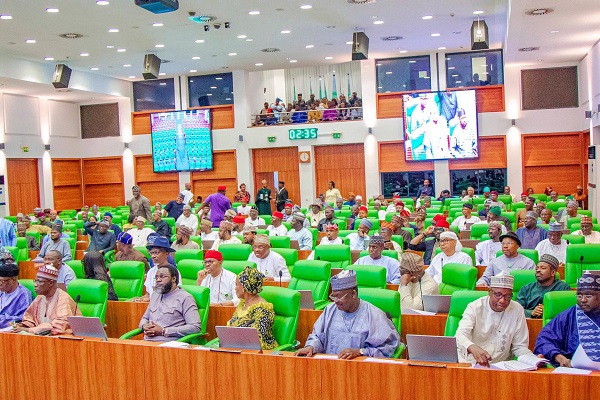🌿 Ruzu Non-Alcoholic Herbal Bitters
Ruzu Non-Alcoholic Herbal Bitters is a natural health supplement specially formulated to:
- ✅ Promote general wellness
- ✅ Detoxify the body
- ✅ Support the treatment of various ailments
Made from a powerful blend of 100% organic and medicinal herbs, Ruzu is completely alcohol-free, making it ideal for:
- 👪 All age groups
- 🌱 Health-conscious individuals
- 🌿 Anyone seeking non-alcoholic herbal remedies
Whether you're looking to boost your vitality, cleanse your system, or support healing the natural way, Ruzu Bitters offers a trusted herbal solution.
The Dangote Refinery and other modular refineries are assets of vital national interest, according to Hon. Ikenga Imo Ugochinyere, Chairman of the House of Representatives Committee on Petroleum Resources (Downstream).
Additionally, he urged all parties involved to work together to safeguard, promote, and project these vital national resources.
During the conversation in Abuja, Representative Ugochinyere said that the nation can now proudly brag of growing industrial expansion and refining capability along the energy value chain thanks to the activities of these domestic plants.
With 650,000 barrels per day, the Dangote Refinery is currently Africa’s largest, he said, changing the refining environment and enhancing energy stability in the area.
The congressman claims that Indorama Petrochemicals advanced agriculture and gas utilization by increasing its urea and fertilizer capacity to 2.8 million metric tonnes annually.
Additionally, Ugochinyere pointed out that the Waltersmith Modular Refinery in Imo State is growing from 5,000 to 50,000 barrels per day, showcasing the potential of local business. The OPAC Refinery in Delta and related developments in Edo and Rivers are also still moving forward at the same time.
He emphasized that these initiatives are unmistakable signs of rekindled investor confidence in Nigeria’s energy sector, as evidenced by the more than $13 billion in new upstream investments in 2024 alone.
These additional modular refineries, together with the Dangote Refinery, are strategically important national assets. Nigeria can now proudly boast of growing industrial growth and refining capacity along the energy value chain thanks to their enormous advancements.
These advancements are unmistakable signs of rekindled investor interest in Nigeria’s oil sector, as evidenced by the more than $13 billion in new upstream investments in 2024 alone. For the benefit of the nation, we must so preserve, propagate, and support these plants while also encouraging others to emerge,” he said.
Ugochinyere praised the Nigerian Upstream Petroleum Regulatory Commission’s (NUPRC) new policy measures to impose the Domestic Crude Oil Supply Obligation (DCSO) on all Nigerian producers.
“This audacious action guarantees access to crude feedstock for local refineries, including traditional and modular operators, prior to export allocations.
It signifies a significant change from policy rhetoric to real assistance for energy independence, job growth, and local value addition.
The NUPRC has made it clear that Nigeria will process what it produces and consume what it refines by making sure that every barrel of Nigerian crude goes to the Nigerian refinery first.
“This policy is fully supported by the House Committee on Downstream Petroleum Resources, as it is in line with our legislative vision to prioritize domestic refining capacity, improve supply security, and strengthen the naira by reducing reliance on imports,” he stated.
The head of the committee gave the industry participants his word that the panel will take the required legislative actions, including giving local refineries the first say in crude allocations and streamlining rules to eliminate any needless hold-ups.
“We continue to face obstacles, such as regulation overlaps, feedstock constraints, and pricing uncertainties.
The House Committee on Petroleum Resources (downstream) plans to take fresh legislative action to solve these issues by: Giving local refineries the first say in crude allocations.
Simplify rules to eliminate needless hold-ups.
In order to designate refineries as key national assets and guarantee that they receive priority protection and support, help the House draft a Refinery Protection and Promotion Bill.
“Adopt policies that ensure unimpeded access to crude feedstock and encourage refinery operations nationwide to continue without interruption.”
“These actions are essential for maintaining investor trust, generating employment, and enhancing our energy independence. Regarding labor matters, it is important to remember that without industrial harmony, no reform can be successful.
The Committee is aware of the recent labor disputes that have arisen between sector unions and Dangote Refinery. Even though these problems are prevalent in developing nations, national stability and production must never be jeopardized.
Therefore, we urge industry operators and labor unions to constantly seek communication regarding disruptions. In all industrial interactions, the House Committee is prepared to promote harmony, equity, and respect for one another.
Maintaining businesses, preserving jobs, and advancing Nigeria’s economic independence must be our common objectives. Let me stress to all downstream industry participants that accountability is equivalent to profitability,” he continued.
















